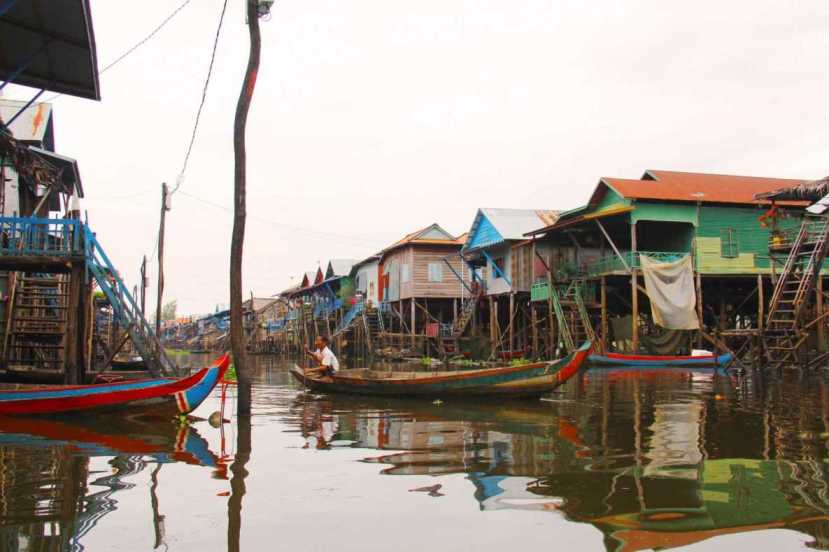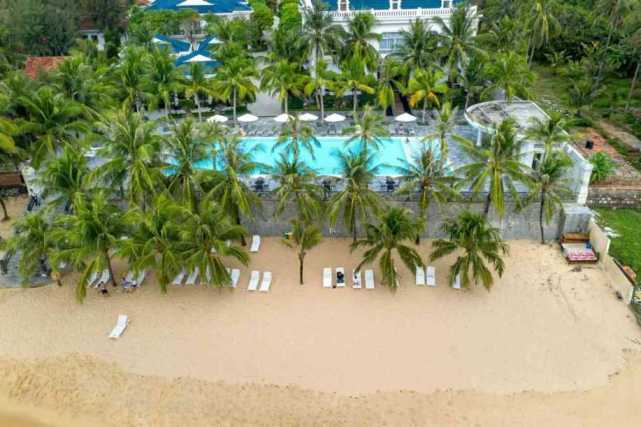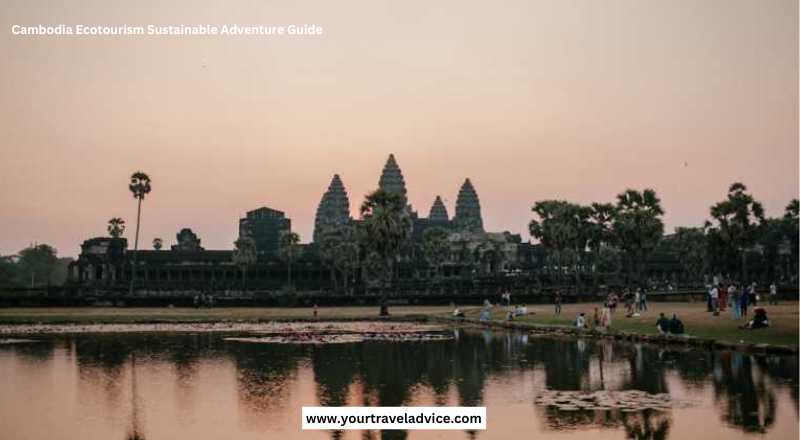Exploring Cambodia Ecotourism Sustainable Adventure Guide has emerged as powerful force in global travel industry offering adventurers opportunity to explore stunning natural landscapes while minimizing their environmental impact. In Cambodia country blessed with rich biodiversity and ancient cultural heritage ecotourism has become beacon of hope for sustainable development and conservation efforts.
This comprehensive guide delves into world of ecotourism in Cambodia exploring its diverse offerings environmental significance & transformative experiences it provides to conscientious travelers. From mist shrouded Cardamom Mountains to life sustaining waters of Tonle Sap Lake well uncover hidden gems. that make Cambodia prime destination for eco conscious adventurers.
Cambodia’s Natural Wonders
Cambodia landscape is tapestry of diverse ecosystems each teeming with unique flora and fauna. country’s natural beauty serves as foundation for its burgeoning ecotourism industry.
Diverse Ecosystems
From dense tropical rain forests to expansive wetlands Cambodia varied terrain supports an incredible array of life. Mekong River which flows through heart of country nurtures fertile plains and creates complex network of tributaries and floodplains. These diverse habitats provide ideal conditions for wide range of plant and animal species to thrive.
Unique Wildlife
Cambodia is home to numerous endangered and rare species making it paradise for wildlife enthusiasts. elusive Indochinese tiger majestic Asian elephant & critically endangered Siamese crocodile are just few of iconic creatures. that inhabit country’s forests and waterways. Birdwatchers can delight in spotting over 600 species of birds including giant ibis Cambodia national bird.
Protected Areas and National Parks
To safeguard its natural treasures Cambodia has established an extensive network of protected areas and national parks. These conservation zones play crucial role in preserving biodiversity and serve as primary destinations for ecotourism activities. Some notable protected areas include:
- Virachey National Park
- Botum Sakor National Park
- Kirirom National Park
- Ream National Park
These protected areas not only conserve critical habitats but also provide opportunities for sustainable tourism. that benefits local communities and supports ongoing conservation efforts.
READ ALSO: Why should you around other countries
Popular Cambodia Ecotourism Destinations
Cambodia offers wealth of ecotourism destinations each with its own unique appeal and opportunities for sustainable exploration.
Cardamom Mountains
The Cardamom Mountains located in southwestern Cambodia are vast expanse of pristine rainforest and one of Southeast Asia’s most important biodiversity hotspots. This rugged mountain range is home to numerous endangered species and offers intrepid travelers chance to trek through lush jungles discover hidden waterfalls & spot rare wildlife.
Ecotourism initiatives in Cardamoms focus on community based tourism where visitors can stay in local villages learn traditional skills & contribute directly to conservation efforts. Guided hikes wildlife watching & visits to conservation projects are popular activities in this region.
Tonle Sap Lake

Tonle Sap largest freshwater lake in Southeast Asia is unique ecosystem. that plays vital role in Cambodia’s ecology and economy. lakes flow changes direction twice year creating complex ecosystem. that supports an abundance of fish birds & other wildlife.
Ecotourism around Tonle Sap centers on floating village tours bird watching expeditions & community based tourism projects. Visitors can learn about traditional fishing methods observe rare water birds & gain insights into challenges facing this fragile ecosystem.
Koh Kong Province
Koh Kong Province bordering Thailand is hidden gem for ecotourism enthusiasts. Its pristine coastline mangrove forests & Cardamom Mountains offer diverse range of eco adventures. Peam Krasop Wildlife Sanctuary with its extensive mangrove forests provides opportunities for kayaking wildlife spotting & learning about coastal ecosystem conservation.
Virachey National Park
Located in remote northeastern corner of Cambodia Virachey National Park is one of countrys largest protected areas. This vast wilderness of mountains forests & rivers is home to remarkable diversity of wildlife including elephants gibbons & hornbills.
Ecotourism in Virachey focuses on multi day trekking expeditions where visitors can immerse themselves in heart of jungle camp under stars & potentially encounter some of parks elusive inhabitants. These trips often involve local guides from indigenous communities providing valuable income and incentives for conservation.
Types of Ecotourism Activities
Cambodia’s ecotourism sector offers wide range of activities. that cater to different interests and fitness levels while promoting environmental awareness and conservation.
Wildlife Watching
For nature enthusiasts wildlife watching is primary draw of ecotourism in Cambodia. Guided tours in protected areas offer chance to observe diverse species in their natural habitats. Some popular wildlife watching experiences include:
- Gibbon spotting in Cardamom Mountains
- Bird watching in wetlands of Tonle Sap
- Dolphin watching on Mekong River
- These activities not only provide unforgettable encounters with nature but also raise awareness about importance of protecting these species and their habitats.
Trekking and Hiking
Cambodia’s varied terrain offers excellent opportunities for trekking and hiking. From gentle nature walks to challenging multi day expeditions there’s something for every level of adventurer. Popular trekking destinations include:
- The dense jungles of Virachey National Park
- The mountain trails of Kirirom National Park
- The coastal paths of Ream National Park
These treks often combine natural beauty with cultural experiences as many routes pass through or near traditional villages.
Community Based Tourism
Community based tourism is cornerstone of Cambodia’s ecotourism industry. This approach involves local communities in tourism development and management ensuring. that benefits of tourism directly support local economies and conservation efforts. Activities may include:
- Homestays with local families
- Participating in traditional craft workshops
- Learning about sustainable farming practices
- Joining community conservation projects
These experiences provide authentic cultural exchanges and deeper understanding of local ways of life.
Conservation Projects
Many ecotourism operators in Cambodia offer opportunities for visitors to participate in or learn about ongoing conservation projects. These may include:
- Reforestation initiatives
- Wildlife monitoring programs
- Marine conservation efforts
Participating in these projects allows travelers to make tangible contribution to conservation efforts and gain hands on experience in environmental protection.
Sustainable Accommodations
Choosing right accommodation is crucial for minimizing environmental impact while supporting local communities. Cambodia offers range of sustainable lodging options for eco conscious travelers.
Eco Lodges
Eco lodges in Cambodia are designed to blend seamlessly with their natural surroundings while minimizing environmental impact. These accommodations often feature:
- Solar power and renewable energy systems
- Water conservation measures
- Locally sourced and sustainable building materials
- Organic gardens for fresh produce
Many eco lodges also support local conservation initiatives and provide employment opportunities for nearby communities.
Homestays
Homestays offer an immersive cultural experience while directly benefiting local families. Staying with Cambodian family provides insights into daily life traditional customs & local cuisine. This type of accommodation often has lower environmental impact and provides more authentic travel experience.
Responsible Resorts

For those seeking more luxurious accommodations Cambodia has growing number of responsible resorts. that prioritize sustainability. These establishments often implement:
- Waste reduction and recycling programs
- Energy efficient systems
- Local and organic food sourcing
- Community outreach and support programs
When choosing resort look for certifications or affiliations with recognized sustainable tourism organizations.
Cultural Immersion
Ecotourism in Cambodia extends beyond nature experiences to include rich cultural interactions fostering deeper understanding and appreciation of country’s heritage.
Local Traditions and Customs
Cambodia’s culture is deeply rooted in its ancient Khmer heritage Buddhism & agricultural traditions. Ecotourism provides opportunities to experience these cultural elements firsthand through:
- Participation in traditional ceremonies
- Visits to local temples and monasteries
- Learning about traditional arts and crafts
- Experiencing rural village life
These cultural encounters offer insights into Cambodia’s rich history and ways in which traditional practices continue to shape modern life.
Interaction with Indigenous Communities
Cambodia is home to several indigenous groups each with their own unique languages customs & traditional knowledge. Responsible ecotourism initiatives provide opportunities for respectful interactions with these communities such as:
- Guided visits to indigenous villages
- Learning about traditional forest management practices
- Participating in cultural exchange programs
These experiences not only enrich travelers understanding but also support preservation of indigenous cultures and their traditional lands.
Environmental Conservation Efforts
Ecotourism in Cambodia goes hand in hand with environmental conservation with many tour operators and accommodations actively participating in or supporting various initiatives.
Reforestation Projects
Deforestation has been significant issue in Cambodia & many ecotourism initiatives include reforestation efforts. Travelers can participate in tree planting activities or visit nurseries where native species are grown for reforestation programs.
Wildlife Protection Initiatives
Several organizations in Cambodia work tirelessly to protect endangered species and their habitats. Ecotourists can learn about and support these efforts through:
- Visits to wildlife rescue centers
- Participation in habitat restoration projects
- Supporting anti poaching patrols
These initiatives raise awareness about importance of wildlife conservation and provide crucial funding for ongoing protection efforts.
Plastic Reduction Programs
Plastic pollution is growing concern in Cambodia particularly in coastal areas and around major tourist sites. Many ecotourism operators are implementing plastic reduction programs such as:
- Providing reusable water bottles and refill stations
- Using biodegradable packaging materials
- Organizing beach and river clean up activities
By participating in these programs travelers can actively contribute to reducing plastic waste and protecting Cambodia’s natural environments.
Responsible Travel Practices
To ensure. that ecotourism truly benefits both environment and local communities its essential for travelers to adopt responsible practices throughout their journey.
Minimizing Environmental Impact
Eco conscious travelers can reduce their environmental footprint by:
- Using refillable water bottles and avoiding single use plastics
- Choosing environmentally friendly transportation options when possible
- Staying on designated trails and respecting wildlife
- Using biodegradable toiletries and sunscreens
Supporting Local Economies
One of key principles of ecotourism is ensuring. that tourism benefits local communities. Travelers can support local economies by:
- Purchasing locally made souvenirs and handicrafts
- Eating @ locally owned restaurants
- Hiring local guides for tours and activities
- Choosing community based accommodations
Respecting Cultural Norms
Respecting local customs and traditions is crucial for responsible travel. Visitors should:
- Dress modestly especially when visiting temples or rural areas
- Ask permission before taking photographs of people or sacred sites
- Learn basic Khmer phrases and greetings
- Be mindful of local etiquette and social norms
By following these practices travelers can ensure. that their visit has positive impact on both environment and local communities.
Best Time to Visit
Understanding Cambodia’s climate and seasonal variations is crucial for planning an ecotourism trip. that maximizes enjoyment and minimizes environmental impact.
Seasonal Considerations
Cambodia has two distinct seasons:
- Dry Season (November to April): This is generally considered best time for ecotourism activities. weather is more predictable with lower humidity and minimal rainfall. Its ideal for trekking wildlife watching & visiting remote areas.
- Wet Season (May to October): While often overlooked wet season can offer unique experiences. Landscapes are lush and green waterfalls are @ their most impressive & there are fewer tourists. However some remote areas may be inaccessible due to flooding.
Weather Patterns
- Cool Season (November to February): This is most popular time for tourists with comfortable temperatures and low humidity. Its excellent for outdoor activities but can be crowded @ popular sites.
- Hot Season (March to May): Temperatures can soar making outdoor activities challenging. However this is good time for wildlife watching as animals gather around water sources.
- Rainy Season (June to October): While frequent short downpours occur they rarely last all day. countryside is beautifully green & Tonle Sap Lake is @ its fullest making it an excellent time for boat trips and birdwatching.
Consider these seasonal factors when planning your ecotour to ensure best possible experience while minimizing your impact on sensitive ecosystems.
READ ALSO: Photography Travel Aesthetic Techniques Unveiled
Planning Your Eco tour
Careful planning is essential for successful and responsible ecotourism experience in Cambodia.
Choosing Reputable Tour Operator
Selecting right tour operator is crucial for ensuring your trip is both enjoyable and environmentally responsible. Look for operators that:
- Have clear commitment to sustainable practices
- Work closely with local communities
- Employ local guides and staff
- Have positive reviews and recommendations from previous travelers
- Are members of recognized ecotourism or sustainable tourism associations
Research thoroughly and don’t hesitate to ask operators about their sustainability policies and community involvement.
Essential Items to Pack
Packing appropriately can help minimize your environmental impact and ensure you’re prepared for Cambodia’s diverse environments. Consider including:
- Reusable water bottle and water purification system
- Biodegradable toiletries and reef safe sunscreen
- Quick dry lightweight clothing suitable for tropical climates
- Comfortable sturdy walking shoes for trekking
- Insect repellent (preferably natural)
- Small first aid kit
- Reusable shopping bag
- Remember to pack light to reduce your carbon footprint during transportation.
Health and Safety Considerations
- While ecotourism in Cambodia is generally safe its important to take certain precautions:
- Consult with your doctor about necessary vaccinations and medications
- Purchase comprehensive travel insurance. that covers adventure activities
- Be cautious with food and water hygiene especially in remote areas
- Respect wildlife and maintain safe distance from animals
- Follow guide instructions carefully especially during trekking or wildlife encounters
- Be prepared for limited medical facilities in remote areas
- By taking these precautions you can ensure safe and enjoyable ecotourism experience while minimizing risks to yourself and environment.
